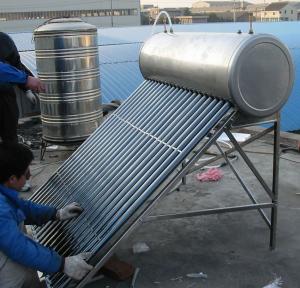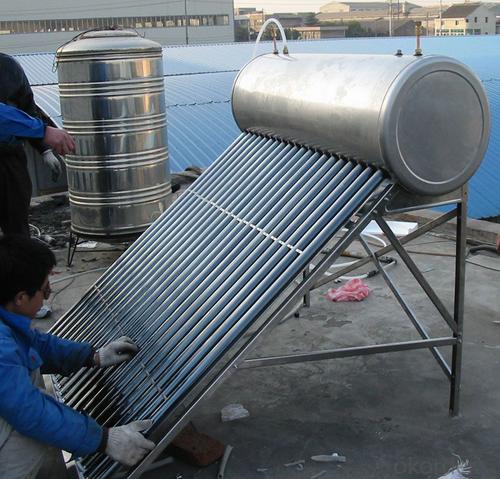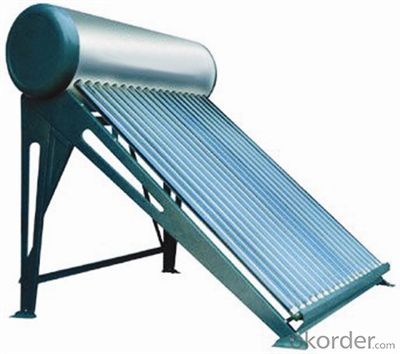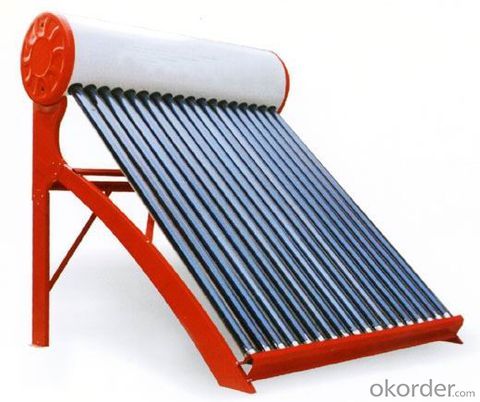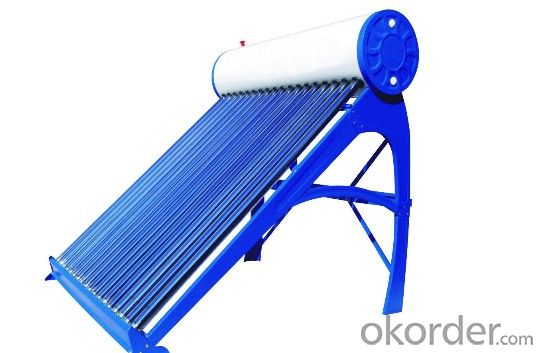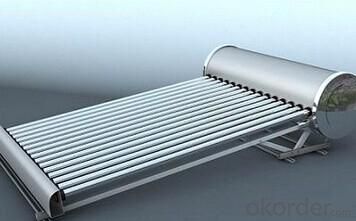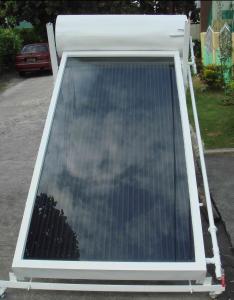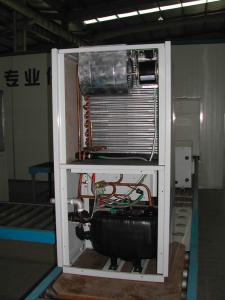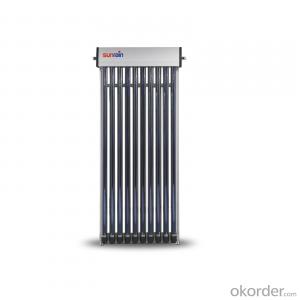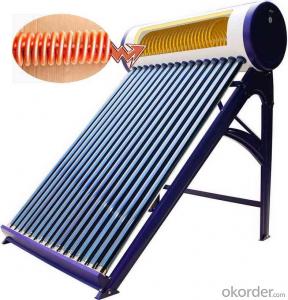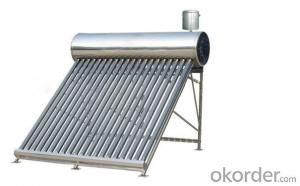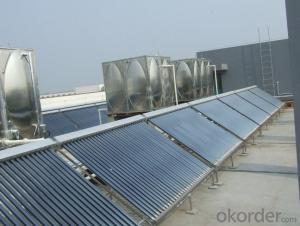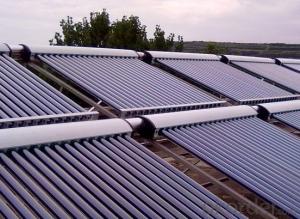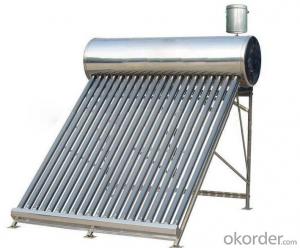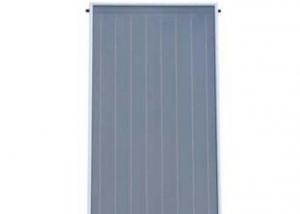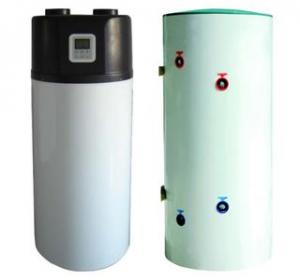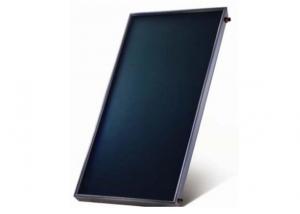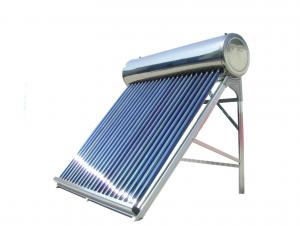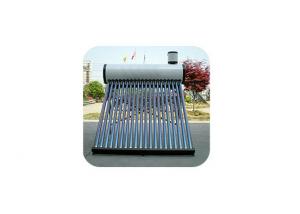Solar Water Heater Tank - Stainless Steel Non-Pressure Solar Water Heaters at Cheap Prices
- Loading Port:
- China main port
- Payment Terms:
- TT OR LC
- Min Order Qty:
- 10 set
- Supply Capability:
- 1000 set/month
OKorder Service Pledge
OKorder Financial Service
You Might Also Like
Working Principle of Domestic Solar Water Heaters:
Solar energy, in essence, is an electromagnetic wave, a type of strong optical radiation, which is produced by thermonuclear fusion reaction. The energy of the solar radiation is transmitted through the liught of different wave length. The solar water heater is designed to mainly take in the energy of visible light & near ultra red light through the selective absorbing coating of vacuum tubes.When the water in the solar collector is heated by the solar radiation, its temperature rises. As a result, the water in the solar collector and the water in the tank form natural convection because of density contrast casued by the temperature difference. So the water of the higher temperature is incessantly forced into the insulated solar water tank( As shown in the figure).
Features
<1> Imported SUS304-2B food-level stainless steel,thickness:0.31~0.5mm
<2> Outer tank: High quality stainless steel,thickness:0.31~0.5mm
<3>Insulation: 50~55mm polyurethane foam
<4> Vacuum tube: CU/SS-AL/N red tube
<5> Frame: Stainless steel/Aluminum alloy,thickness:1.2~2mm
<6> Reflector: Stainless steel/Aluminum alloy as option
<7> Available accessories: Feeding tank,solar controller,electric heater, Mag rod,thermostatic mixing valve
Specification
ITEM.NO | SPECIFICATION | EFFECTIVE LIGHT AREA | TANK'S CAPACITY | APPLICATION PEOPLE | CBM | |||
DIAMETER OF WATER TANK | QTY OF TUBE(pcs) | DIAMETER OF TUBE | LENGTH OF TUBE | |||||
Z-NS5810 | 460mm | 10 | 58mm | 1.8m | 1.04 | 100L | 4 | 0.37 |
Z-NS5812 | 460mm | 12 | 58mm | 1.8m | 1.25 | 120L | 4-5 | 0.44 |
Z-NS5815 | 460mm | 15 | 58mm | 1.8m | 1.56 | 150L | 6 | 0.56 |
Z-NS5818 | 460mm | 18 | 58mm | 1.8m | 1.87 | 180L | 7-8 | 0.64 |
Z-NS5820 | 460mm | 20 | 58mm | 1.8m | 2.08 | 200L | 8 | 0.7 |
Z-NS5825 | 460mm | 25 | 58mm | 1.8m | 2.61 | 250L | 10 | 0.89 |
Z-NS5830 | 460mm | 30 | 58mm | 1.8m | 3.13 | 300L | 12 | 1 |
Z-NS5836 | 460mm | 36 | 58mm | 1.8m | 3.75 | 360L | 14-15 | 1.3 |
Z-NS5840 | 460mm | 40 | 58mm | 1.8m | 4.17 | 400L | 16 | 1.4 |
Z-NS5845 | 460mm | 45 | 58mm | 1.8m | 4.69 | 450L | 18 | 1.6 |
Product Details Show
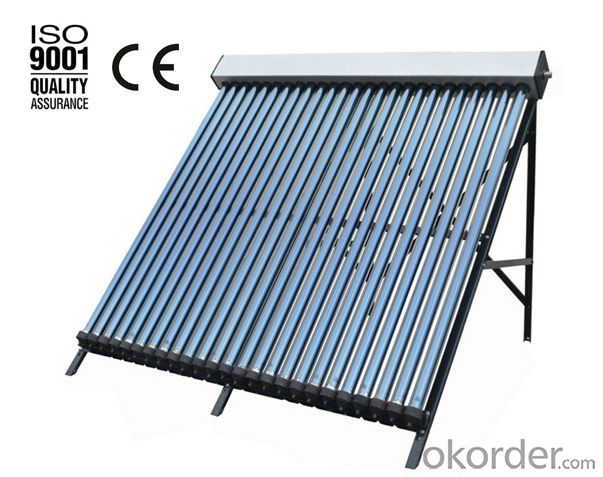
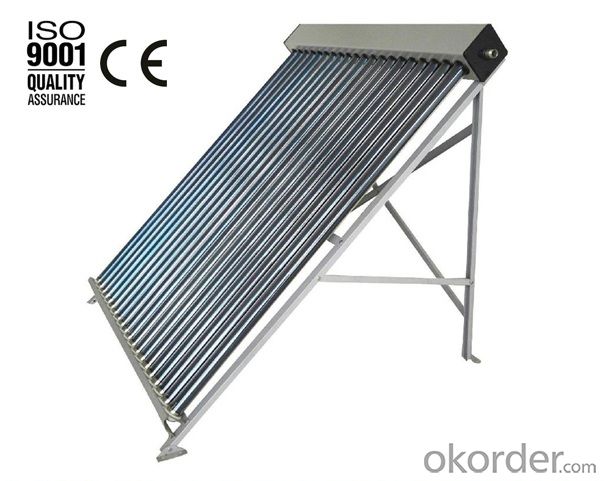
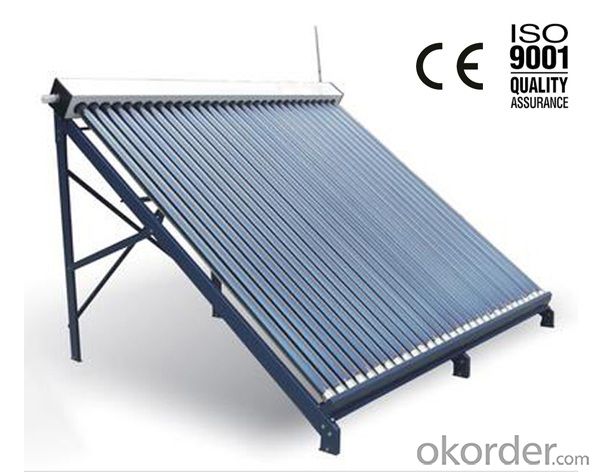
FAQ
1. Q: Are you a factory or trading company?
A: We are a factory. Especially for Solar Controller, PWM solar controller 50A12V/24V
2. Q: Where is your factory located? How can I visit there?
A: Our factory is located in Guangzhou, China. You are warmly welcomed to visit us!
3. Q: what other product you have except such Solar Lighting?
A: We have poly ,mono cells and panels. Off grid solar system, like off grid solar inverter, pure sine wave inverter, solar collector, solar controller, solar charger, Portal solar system, battery, DC Fan, Solar Led Light.
4. Q: Can the price be cheaper?
A: Of course, you will be offered a good discount for big amount.
5. How can I get a sample?
A: Please call us or send email for asking the samples.
- Q: How does a solar water heater impact water heater noise levels?
- A solar water heater generally has a positive impact on water heater noise levels. Since it relies on the sun's energy to heat the water, it doesn't require a noisy combustion process or electric heating elements. This results in a quieter operation compared to traditional water heaters, contributing to a more peaceful and noise-free environment.
- Q: Solar water heater inside the water can drink it?In summer, the water inside the solar energy is very hot, and then put the water in the pot on the gas to burn, so you can quote?I said that the water in the solar energy into the pot in the boil, so you can drink it? The water inside the solar energy is not hot, put the pot inside the burning is not fast, faster than the direct release of cold water?
- Solar water inside the highest temperature but also more than and 100 degrees, and did not really boil, not up to the standard of drinking water, and that the water is running water, it is recommended not to drink
- Q: How does the insulation of the storage tank affect the efficiency of a solar water heater?
- The efficiency of a solar water heater greatly depends on the insulation of its storage tank. Insulation plays a vital role in minimizing heat loss from the stored water, allowing it to retain heat for longer durations. Consequently, this reduces the need for constant heating and enhances the overall energy efficiency of the entire system. When the storage tank is adequately insulated, it effectively maintains the desired water temperature for extended periods, even during times of low solar radiation or at night. This means that the solar water heater can continuously provide hot water without relying on additional energy sources, such as electricity or gas, for heating purposes. Conversely, insufficient insulation in the storage tank results in rapid heat loss and a significant drop in water temperature over time. As a result, the solar water heater needs to work harder and for longer durations to reheat the water to the desired temperature, leading to increased energy consumption. Additionally, frequent heating cycles can strain the system, potentially reducing its lifespan and incurring higher maintenance costs. In conclusion, a well-insulated storage tank is crucial for maximizing the efficiency of a solar water heater. It minimizes energy wastage by reducing heat loss and ensures a consistent supply of hot water, even during periods of low solar radiation. Investing in high-quality insulation materials and proper installation can significantly enhance the overall efficiency and performance of a solar water heater system.
- Q: Can a solar water heater provide hot water during cloudy days?
- No, a solar water heater relies on sunlight to heat water, so it may not be able to provide hot water during cloudy days when there is limited or no sunlight available.
- Q: How does a solar water heater impact water heater efficiency ratings?
- A solar water heater significantly improves water heater efficiency ratings by utilizing renewable energy from the sun to heat the water. This reduces the reliance on traditional energy sources and lowers energy consumption, resulting in higher efficiency ratings for the water heater.
- Q: What is the expected lifespan of solar water heater components?
- The expected lifespan of solar water heater components can vary depending on factors such as quality of materials, maintenance, and usage. However, on average, solar water heater components can last anywhere from 10 to 20 years.
- Q: How does the quality of the solar panels impact the efficiency of a solar water heater?
- The quality of the solar panels directly influences the efficiency of a solar water heater. High-quality solar panels are designed to effectively convert sunlight into electricity, which in turn powers the water heater's heating element. These panels have advanced photovoltaic cells that can capture and convert a larger amount of sunlight into usable energy, resulting in higher efficiency. On the other hand, low-quality solar panels may have subpar photovoltaic cells that are less efficient in converting sunlight into electricity. This can lead to reduced energy production, meaning the solar water heater will have a lower output and may struggle to heat the water effectively. Additionally, low-quality panels may degrade more quickly over time, further decreasing their efficiency and overall performance. The quality of the solar panels also affects their durability and resistance to environmental factors. High-quality panels are typically made with durable materials and undergo rigorous testing to ensure they can withstand harsh weather conditions, such as extreme temperatures, high winds, and heavy rain. This durability ensures that the solar panels can continue operating efficiently for a longer period. In summary, the efficiency of a solar water heater is heavily dependent on the quality of the solar panels used. Investing in high-quality panels with advanced photovoltaic cells and durability will result in a more efficient system that can effectively convert sunlight into energy to heat water.
- Q: Can a solar water heater be used in areas with limited access to installation services?
- Yes, a solar water heater can be used in areas with limited access to installation services. Solar water heaters are relatively simple and can be installed by individuals with basic plumbing skills. Additionally, there are portable and DIY solar water heater kits available that can be easily assembled and used without the need for professional installation services.
- Q: What is the difference between passive and active solar water heaters?
- Passive and active solar water heaters are two distinct types of systems employed for utilizing solar energy in heating water. Their dissimilarities primarily lie in their mechanism and complexity level. Passive solar water heaters depend on natural convection and gravity for the circulation of water within the system. Typically, they comprise a storage tank positioned above the solar collectors, which absorb sunlight and warm the water. As the hot water rises, it effortlessly moves into the storage tank, while colder water replaces it at the bottom of the collectors. Due to the absence of mechanical pumps or controls, passive systems are simpler and generally more cost-effective to install and maintain. However, their efficiency may be comparatively lower than active systems, especially in regions with limited sunlight or during colder climatic conditions. On the contrary, active solar water heaters make use of pumps or other mechanical devices to circulate water between the solar collectors and the storage tank. These systems are more intricate and necessitate additional components like sensors, controllers, and pumps to regulate water flow and optimize heat transfer. Active systems are usually more efficient and capable of providing a greater amount of hot water, rendering them suitable for larger households or commercial applications. Nonetheless, they generally entail higher installation and maintenance costs due to the added equipment and energy requirements. To summarize, the primary distinction between passive and active solar water heaters lies in the complexity level and the requirement for mechanical components. Passive systems rely on natural convection, whereas active systems employ pumps and controls for water circulation. Passive systems are simpler and more cost-effective, although they may exhibit lower efficiency, while active systems are more complex, efficient, and suitable for larger-scale applications. The choice between the two depends on factors such as budget, available sunlight, and hot water demand.
- Q: Are there any noise-related issues with solar water heaters?
- No, solar water heaters do not produce any noise as they rely on passive processes to heat water, such as sunlight absorption and heat transfer through pipes.
Send your message to us
Solar Water Heater Tank - Stainless Steel Non-Pressure Solar Water Heaters at Cheap Prices
- Loading Port:
- China main port
- Payment Terms:
- TT OR LC
- Min Order Qty:
- 10 set
- Supply Capability:
- 1000 set/month
OKorder Service Pledge
OKorder Financial Service
Similar products
Hot products
Hot Searches
Related keywords
